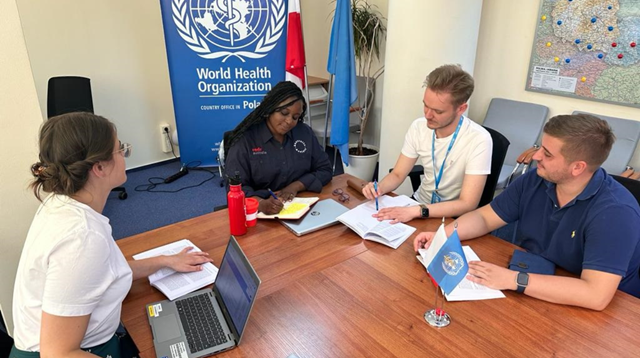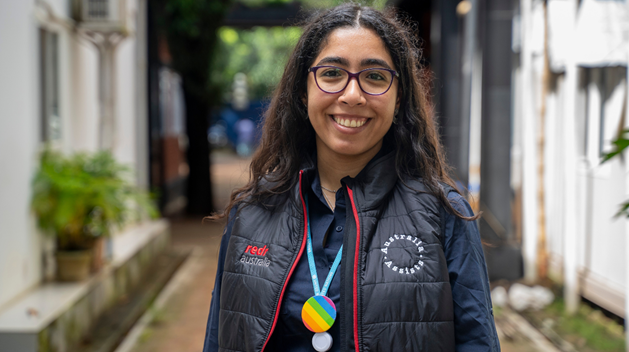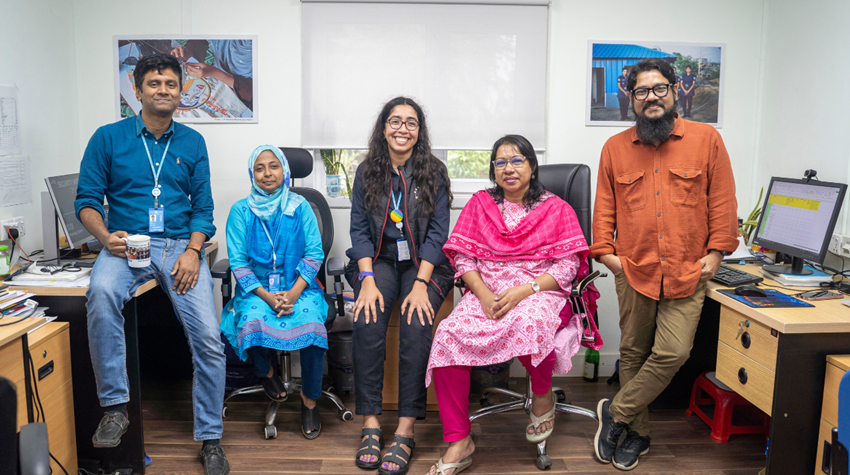Gender-based violence happens more than anyone would like which is why it’s important to change the narrative as well as damaging behaviours that are more likely to affect women, girls and gender diverse people.
It can happen anytime however gender- based violence is more likely to occur in times of crisis and vulnerable settings, during armed conflict or after a disaster has struck.
The 16 Days of Activism against Gender-Based Violence (GBV) begins 25 November, the International Day for the Elimination of Violence against Women, and continues until 10 December, Human Rights Day.
The Australia Assists Program is the Australian Government’s Humanitarian deployment program and is deeply committed to supporting the ongoing work to eliminate GBV in humanitarian contexts.
Integrating gender equality and protection into the disaster cycle
Based in Tonga at the Ministry of Internal Affairs, Australia Assists Program deployee Karishma was seconded from UN Women in Fiji to provide technical support to the Government’s Safety and Protection Cluster. Working as the Gender and Protection Advisor, she is supporting GBV protection efforts, and mainstreaming Gender and Protection in disaster response. “Disasters don’t discriminate, they affect us all, but I believe that women and girls are impacted differently,” says Karishma.
“During an emergency, the experience has been that women and girls do get exposed to other risks such as Gender-Based Violence because of the interruption to services.”
Tonga, like many Pacific nations, faces multiple hazards, such as drought and cyclones. In January 2022, the island experienced a volcanic eruption and tsunami. “During an emergency women, children, persons with disability and the elderly are at heightened risk,” says Karishma. “They have specific needs, and they require support. Our role is to ensure that during the response and recovery phase, efforts are targeted to these at-risk groups.”
All emergency planning – from preparedness, through to response and recovery – needs to incorporate protection and gender lenses. In times of increased risk, Gender-Based Violence increases. The work of Australia Assists deployees such as Karishma helps to ensure that at-risk populations are supported and included before disaster strikes.
“I strongly believe,” says Karishma, “that any response is only as good as your preparedness.”
Supporting survivors
Australia Assists Program deployee Saratu is in Poland, supporting Ukrainian refugees as a Gender Specialist within the World Health Organisation (WHO).
In her role, Saratu has been helping circulate the WHO’s guidelines on best practice GBV response within the health system in Poland. She is delivering a project aimed at supporting and strengthening the health system’s care for survivors of sexual violence and intimate partner violence.
This project helps health facilities implement the WHO minimum clinical standards through ensuring health system readiness, quality assurance assessments and clinical trainings for health care providers on quality care.
Saratu conducted a baseline assessment with a health facility in Krakow using the results, to evaluate the training requirements that will best support the health system, to in turn better support survivors of GBV.
Saratu believes that a holistic approach to the health system is best practice for sustainable success. Community, academia and Civil Society Organisations (CSOs) can also benefit from increased awareness about the care for people impacted by GBV.
“Following my visit to their facility and a request for technical support, I supported women-led CSO Feminoteka through a donation from WHO of Polish language clinical publications for use in their crisis centre, which supports survivors of violence,” says Saratu. “I have really focussed on strengthening coordination between academics, piloting health facilities and women-led CSOs to encourage learning among them and adapting and contextualizing the implementation of the WHO guidelines in the Polish context, using the different expertise of each group.”
Saratu is sharing her findings and WHO Guidelines with as many local stakeholders as possible so they can successfully keep delivering GBV survivor support beyond her deployment. “We are currently recruiting a team member whom I can mentor on GBV programming, with the goal of them taking on my work,” says Saratu. “This will support sustainability of the programming after my deployment is over, which is the best outcome for everyone.”
 Saratu works closely with WHO colleagues to strengthen GBV response in Poland.
Saratu works closely with WHO colleagues to strengthen GBV response in Poland.
Protection from GBV in Bangladesh
Working in Bangladesh’s Cox’s Bazar, GBV Specialist Reem is supporting UN Women’s programming on GBV prevention, protection and response in host communities and the Rohingya refugee camps.
Cox’s Bazar is home to the biggest refugee camp in the world, and over 930,000 Rohingya there rely on humanitarian assistance to survive. The crisis has an ongoing impact on communities hosting the Rohingya as well.
“The people here are well aware of GBV issues, and many understand where it comes from and how it impacts them,” says Reem. “Conversations or activities don’t start from nothing; there is a good basis for work, and many women and women-led organisations from the community are working hard for change within their community.”
Reem has been working to provide technical advice and coordination support to UN Women’s GBV efforts. She advocates for more training for local government and camp staff, and more training on gender responsive policing with the local battalion in the camps, which now has a number of female officers. “It’s important that we partner with local agencies and host communities to strengthen the unified voice of local partners supporting women-led organisations because they will be the ones to stay and deliver,” says Reem.
 Reem is a GBV Specialist supporting UN Women in Cox’s Bazar, Bangladesh.
Reem is a GBV Specialist supporting UN Women in Cox’s Bazar, Bangladesh.
“GBV is still a huge issue globally,” says Reem. “GBV impacts women, but it also impacts everyone else; its negative impact on the communities can be long and harmful, and no progress would happen appropriately in society if we do not address GBV issues and work together to eliminate it and support survivors."
“That’s why it is crucial to focus on combatting it through social and legal mechanisms, and through prevention and support to survivors.”
“I want to see a change in the combatting of GBV,” she says. “It’s satisfying to be part of any small or significant change in this field. It makes me part of the process of the change I want to see in the world.”
During the 16 Days of Activism and at all other times it’s reassuring to know that highly skilled Australia Assists Program deployees like, Karishma, Saratu and Reem are making a difference for women and girls, as well as communities negatively impacted by Gender-Based Violence.


